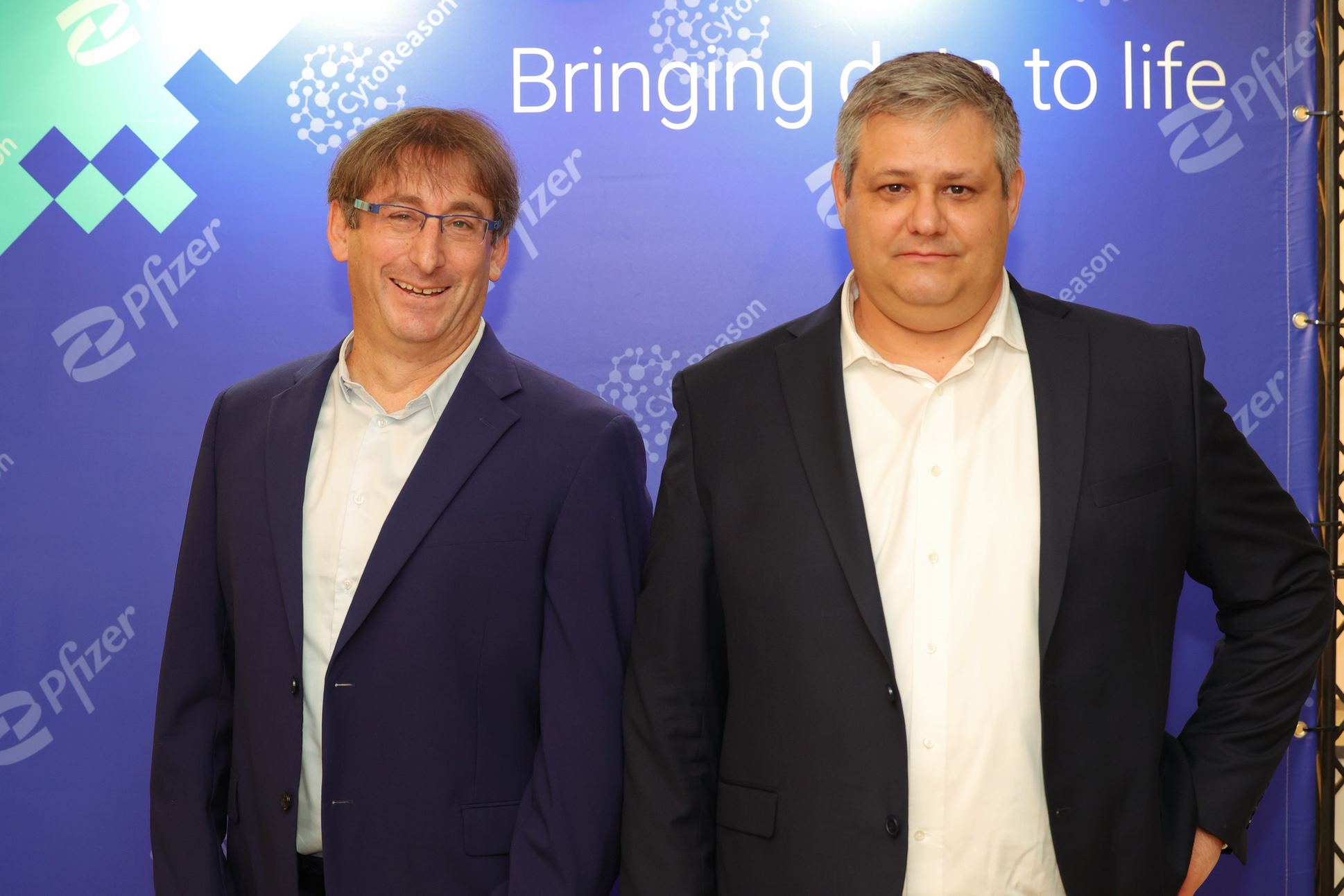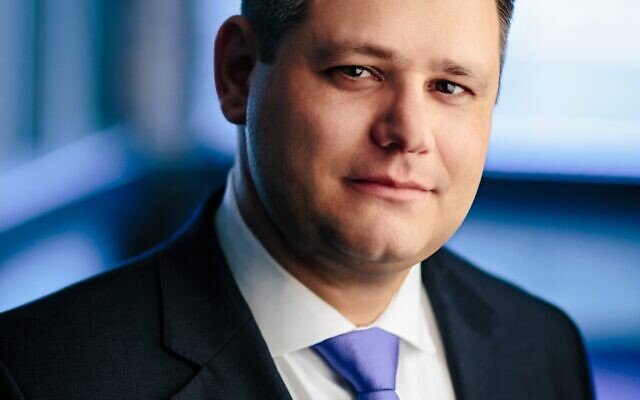Israeli start-up secured a deal with Pfizer just a year after launch
David Harel, founder of CytoReason, tells the tale of every entrepreneur's dream
It’s every entrepreneur’s dream: start a business and secure a deal with one of the world’s biggest companies the following year. That’s exactly what David Harel and the team at CytoReason did when they partnered with Pfizer, the world’s largest research-based pharmaceutical company.
Israeli start-up CytoReason has established itself as a global leader in the computational modelling of human diseases thanks to its ability to combine human data and the AI tools needed to accelerate drug development.
The company’s technology can build a computational representation of a disease, assess the effectiveness of drugs for that disease, and predict which patients might respond best to different drugs. And it can do so at speed.
The Tel Aviv start-up recently (in September) announced an extension of its partnership with Pfizer, in a commercial deal worth up to $110m over the next five years. Under the agreement – CytoReason’s most significant to date – Pfizer will use CytoReason’s AI technology for their drug development programs, and also make a $20m equity investment in CytoReason.
David Harel, CytoReason’s co-founder and chief executive, explains: “The big picture problem of the pharmaceutical industry, and all industries globally, is that data is growing exponentially but we are using yesterday’s practices to analyse it, so there’s a growing gap. There’s so much data that can be aggregated and it’s becoming impossible for a human to process.” Cue CytoReason and its team of 80 biologists, bioinformaticians, and data engineers coming up with computational models that can be used to find new disease targets and biomarkers, and predict which patients may best respond to novel treatments.
 Pfizer uses CytoReason’s models in its research to enhance the understanding of the immune system, as it develops innovative drugs for auto-immune and immune-oncology diseases. CytoReason’s technology was also used to help Pfizer compare and choose drugs for inflammatory bowel disease. These are now in advanced trials. “There are two things we can do; take one drug and compare it across multiple diseases and take multiple drugs and compare them head-to-head.”
Pfizer uses CytoReason’s models in its research to enhance the understanding of the immune system, as it develops innovative drugs for auto-immune and immune-oncology diseases. CytoReason’s technology was also used to help Pfizer compare and choose drugs for inflammatory bowel disease. These are now in advanced trials. “There are two things we can do; take one drug and compare it across multiple diseases and take multiple drugs and compare them head-to-head.”
Founded in 2016, CytoReason, says Harel, is bridging the gap between the ground-breaking science and technology that is done in Israel and the industrial expertise in other countries, notably Asia, Europe and the US.
“Israel needs to rely on life sciences as well as the traditional powerhouses like energy and hi-tech, and the path to do that is to leverage the existing assets of Israel which is AI. We believe that by taking these unique tech capabilities and applying them to healthcare and life sciences, we will be able to attract larger global players to the Israeli ecosystem, specifically within pharmaceuticals.” Quite. Along with Pfizer, CytoReason now partners with five of the world’s top ten pharmaceutical companies, including GSK, Roche, and Merck.

So how did the collaboration with Pfizer come about? Harel explains: “In 2017, my friend introduced me to Pfizer’s Global Innovation Lead. She liked what we do. Three weeks later, co-founder Shai Shen-Orr and I met the Pfizer scientists. They also liked what we do. Three months later we signed our first deal. Since then, our scientists have been meeting their Pfizer counterparts almost weekly. They’ve been working together on dozens of drug programs across dozens of diseases.” He says: “Because CytoReason is a tech company, we realised we need to work with leading pharma companies like Pfizer to reach patients at scale. And our friends at Pfizer realised that to reach patients with cutting-edge technology they must find a way to integrate clinical data with molecular data. They realised that the doctor in the clinic must build on molecular features and the bioinformatician in the lab must build on data from the clinic.” He continues: “And our computational disease models enable pharma and biotech companies to conduct synthetic trials based on masses of clinical and molecular data, before spending hundreds of millions of dollars on human trials.”
A former officer in the Israel Defence Force, Harel is an experienced business leader with proven strategic thinking and demonstrated execution in healthcare, technology, and finance.
When Covid hit, CytoReason’s team built computational models for the diseases associated with Acute Respiratory Distress Syndrome (ARDS) and sent it to their customers for free to enable them to develop anti-viral drugs. The details of which are confidential.
Will Israel be key to drug research and curing diseases like cancer in the future? “It’s our mission to make this statement true. One of the greatest challenges facing drug development for disease is the need for constant innovation. The tech coming out of Israel will be the game changer in this constant struggle. Israel has been a leader in innovative medical devices for a long time, (the camera pill and stents were invented in Israel) but not in therapeutics/drugs.”
Something CytoReason is on its way to changing.

Thank you for helping to make Jewish News the leading source of news and opinion for the UK Jewish community. Today we're asking for your invaluable help to continue putting our community first in everything we do.
For as little as £5 a month you can help sustain the vital work we do in celebrating and standing up for Jewish life in Britain.
Jewish News holds our community together and keeps us connected. Like a synagogue, it’s where people turn to feel part of something bigger. It also proudly shows the rest of Britain the vibrancy and rich culture of modern Jewish life.
You can make a quick and easy one-off or monthly contribution of £5, £10, £20 or any other sum you’re comfortable with.
100% of your donation will help us continue celebrating our community, in all its dynamic diversity...
Engaging
Being a community platform means so much more than producing a newspaper and website. One of our proudest roles is media partnering with our invaluable charities to amplify the outstanding work they do to help us all.
Celebrating
There’s no shortage of oys in the world but Jewish News takes every opportunity to celebrate the joys too, through projects like Night of Heroes, 40 Under 40 and other compelling countdowns that make the community kvell with pride.
Pioneering
In the first collaboration between media outlets from different faiths, Jewish News worked with British Muslim TV and Church Times to produce a list of young activists leading the way on interfaith understanding.
Campaigning
Royal Mail issued a stamp honouring Holocaust hero Sir Nicholas Winton after a Jewish News campaign attracted more than 100,000 backers. Jewish Newsalso produces special editions of the paper highlighting pressing issues including mental health and Holocaust remembrance.
Easy access
In an age when news is readily accessible, Jewish News provides high-quality content free online and offline, removing any financial barriers to connecting people.
Voice of our community to wider society
The Jewish News team regularly appears on TV, radio and on the pages of the national press to comment on stories about the Jewish community. Easy access to the paper on the streets of London also means Jewish News provides an invaluable window into the community for the country at large.
We hope you agree all this is worth preserving.






















